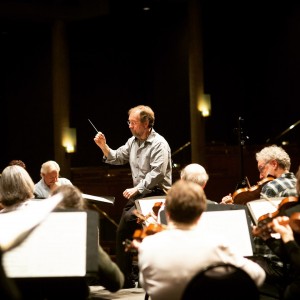 “Thank you for bringing us great music,” said Nicole Neufeld in a heartwarming onstage tribute to her father’s 36 years of work with the Guelph Chamber Choir. Gerald Neufeld is stepping down as artistic director of the Guelph Chamber Choir, having led it for 36 of its 38 years. In a farewell concert on Saturday March 31, 2018, the choir performed Brahms’ Ein deutsches Requiem (A German Requiem) and other smaller works. This was the final performance of the Guelph Chamber Choir’s 2017/18 season, and the final concert with Gerald Neufeld as its artistic director.
“Thank you for bringing us great music,” said Nicole Neufeld in a heartwarming onstage tribute to her father’s 36 years of work with the Guelph Chamber Choir. Gerald Neufeld is stepping down as artistic director of the Guelph Chamber Choir, having led it for 36 of its 38 years. In a farewell concert on Saturday March 31, 2018, the choir performed Brahms’ Ein deutsches Requiem (A German Requiem) and other smaller works. This was the final performance of the Guelph Chamber Choir’s 2017/18 season, and the final concert with Gerald Neufeld as its artistic director.
The first half of the concert was the German Requiem. The second half comprised six smaller works, including Ola Gjeilo’s The Ground (which is the “Pleni sunt coeli” section of the “Sanctus” in his larger Sunrise Mass); Agnus dei, arranged by Kenneth Jennings with Latin text on a choral rendition of Edward Elgar’s Enigma Variations; and Canadian composer Eleanor Daley’s Antiphon, the final movement of her three-piece Let All the World in Ev’ry Corner Sing Easter Anthems.
In an interview the week prior to the concert, Neufeld spoke to The WholeNote about his upcoming final performance. “I wanted to fit into the Easter Weekend,” says Neufeld. “Rather than doing a Latin requiem, I wanted to do one of my favourite works, [Brahms’ Requiem]. It’s such a wonderfully crafted piece. It’s not about sadness, it’s about remembering and joyousness. It’s really for the living rather than the dead.”
For this performance, Neufeld decided on a historically-informed rendition, with Musica Viva Orchestra on period instruments. “It may seem a bit strange to sing the Requiem with only 60 singers and 43 in the orchestra,” says Neufeld, “but the period instruments are so much softer and blend easier with the voice. Brahms’ orchestra wasn’t too much larger than what we’ll have. It’s almost like chamber music in a way. It’s bringing together Brahms’ past with his present, using some Classical sensibilities with newer Romantic harmonic material in a very interesting way.
“I’ve been performing with period players for two decades now,” Neufeld continues. “I love working with them because they want to understand the musical text and how to declaim the music. It makes the music much more effective; it communicates much more clearly to the audience. Our audiences have really loved it.” With a packed house and a thoroughly pleased audience, Neufeld’s artistic choices continue to have a strong impact on audiences in Guelph and the area: the Guelph Chamber Choir sang its first three concerts of its 2017/18 season to a sold-out hall.
At the concert on Saturday, Neufeld’s interpretation using period instruments resulted in a softer, less complex sound in the orchestra and a light, articulate choir. The choir was well-balanced, solidly supported by an exceptional bass section. The first movement of the Requiem does not include violins; with the bass sound of the lower strings and viola anchoring the sound, the choir was free to focus on the music’s emotional content.
Brahms’ Requiem was beautifully presented. Daniel Lichti provided a robust and emotional presentation as bass-baritone soloist. There was a bit of a disconnect at times between his and the choir’s deliveries – most pronounced in the third movement, where Lichti’s emotional and operatic interpretation of “Lord, teach me” was not equally repeated in the choir’s more muted response immediately following him. However, towards the end of the third movement, Neufeld’s period interpretation allowed the “Der gerechten” fugal section to ride above the long-sustains of the double basses without being thrown off. Sheila Dietrich, the soprano soloist, provided a light and comforting solo in the fifth movement. This movement is a cornerstone of the Requiem, providing an angelic moment of healing in this work, which Neufeld describes in the program notes as “comfort for the living that recognizes the human journey through times of grief, but also offers a sense of hope, victory and joy at the end of that journey.”
There were two technical issues that detracted from the overall impact of the piece. The first was ongoing instances within the soprano section of uncontrolled and abundant vibrato, especially noticeable in the fourth “Wie lieblich” movement. The second was recurring registration issues in the tenor sections. With some tenors chest-strong and others in head-tone, there wasn’t an even sound in exposed tenor lines like the “Zu nehmen Preis und Ehre” fugal section of the sixth movement. Otherwise, the blend of the choir was excellent, with a very solid grounding in the basses and a majestic alto presence. Neufeld manages to massage the tension of the Requiem, never letting the choir become too loud and allowing the suspense in the music to blossom slowly.
Neufeld has many memories over his 36 very successful years with the choir. He mentions a few great works among his memories, many of which were done with the Guelph Chamber Choir. He thinks of Mendelssohn’s Elijah, the Monteverdi Vespers, and Bach’s Mass in B Minor. Some of these memories are from abroad as well: “Performing in Austria at the Mozarteum, and the Czech Republic, in the old city of Kroměříž in the Bishop’s palace ballroom. Performing in those acoustical environments [was] really something,” he shares.
Neufeld is not done with music; he would be happy to guest conduct, and loves the rehearsal process. He feels though, that “it’s time for someone younger, who has more energy and new ideas, to take the choir forward. It’s always a good time, when things are going well, to make that transition,” he says. As the Guelph Chamber Choir enters a transition year, there will be two concerts conducted by two conductors shortlisted for Neufeld’s replacement. In the fall of 2018, Patrick Murray takes the reins, while in the spring of 2019, Charlene Pauls leads the choir. One of the two will replace Neufeld. “I would like them to be successful in whatever they choose,” says Neufeld. “I’m looking forward to being in the audience and hearing what comes from the choir under a new director.
“The thing I will remember the most are the people in the choir,” adds Neufeld. “They come because they want to, not because they have to. One of the most memorable conversations I’ve had was with three doctors during the SARS crisis. I was surprised they were at rehearsal when all of this was going on. They just looked at me and said, ‘We can’t afford not to be here. This helps us manage to get through.’ This is a big part of what choirs do. For lack of a better term: this spiritual energy, to keep going with our daily lives, working together.”
In a surprise, the choir performed a very touching final piece in tribute to Neufeld: Ron Jeffers’ setting of Fred Mitchell’s poem “I have had singing.” With his family onstage, Neufeld’s work with the choir was perfectly summed up – with great music, happy voices, and a touching farewell.
The Guelph Chamber Choir, featuring Sheila Dietrich (soprano), Daniel Lichti (bass-baritone) and the Musica Viva Orchestra, performed Brahms’ Ein Deutsches Requiem (A German Requiem) in farewell to outgoing artistic director Gerald Neufeld on March 31, 2018, 7:30pm at River Run Centre, Guelph.



